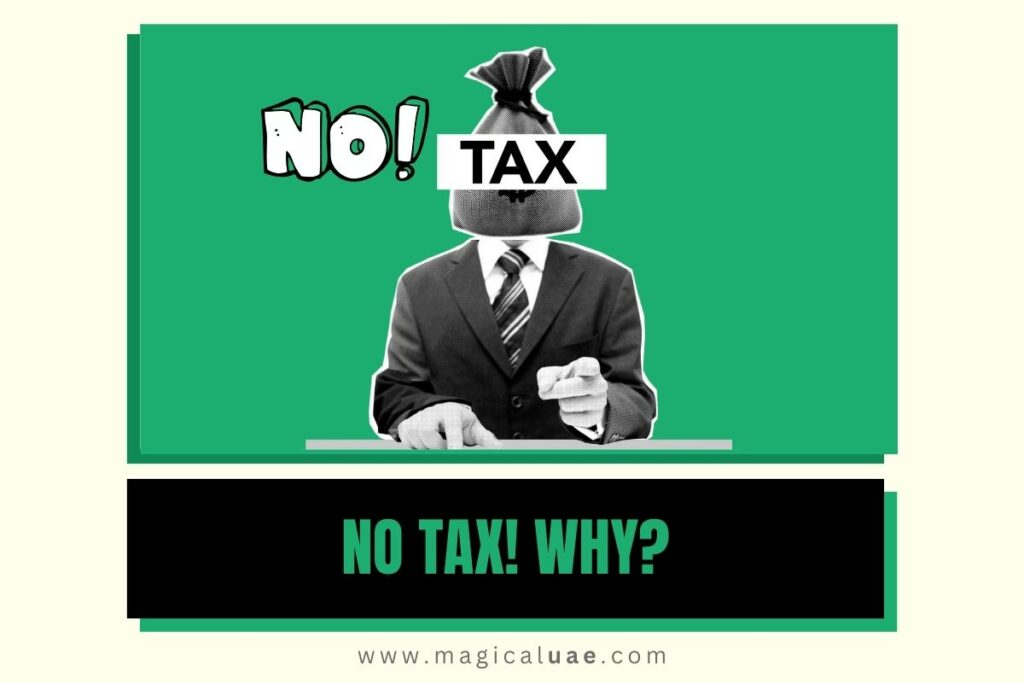Dubai does not have taxes to attract investors and promote economic growth. Its tax-free status helps boost business activities and attracts foreign investments, contributing to its rapid development as a global economic hub.
Dubai stands out as a unique global destination due to its lack of taxes. This is a deliberate strategy implemented by the Dubai government to attract investors, promote economic growth, and encourage entrepreneurship. By eliminating personal income tax, corporate tax, and value-added tax (VAT), Dubai creates a favorable environment for businesses and individuals to thrive.
This tax-free status not only entices foreign investors but also stimulates local businesses, contributing to Dubai’s rapid development as a global economic hub. Additionally, the absence of taxes allows businesses to retain more of their profits, enabling them to invest in expansion, innovation, and job creation. With its tax-free status, Dubai offers a lucrative proposition for those looking to establish or expand their businesses in a thriving global marketplace.

The Origins Of Dubai’s Tax-Free Status
Dubai’s tax-free status can be traced back to a historical context that shaped its current policies. Sheikh Rashid bin Saeed Al Maktoum played a significant role in implementing these tax-free policies, envisioning a prosperous economic future for Dubai. By creating a business-friendly environment, with no corporate or personal income taxes, Dubai attracted foreign investments and stimulated its economy.
This bold move transformed the city into a global financial hub and a preferred destination for businesses and entrepreneurs. The absence of taxes not only encouraged economic growth but also enhanced the competitiveness of Dubai’s market. This strategic decision has been instrumental in attracting international companies, boosting tourism, and positioning Dubai as a top destination for business and leisure.
The tax-free status remains a key factor in Dubai’s rise as a prominent economic powerhouse in the Middle East.
Understanding Dubai’s Tax Structure
Dubai is known for its unique tax structure that distinguishes it from other countries. It offers a tax-free environment, making it an attractive destination for businesses and individuals. Understanding Dubai’s tax system is crucial for anyone considering investing or relocating to this city.
The tax structure in Dubai is based on key components such as no income tax, no corporate tax, and no value-added tax (VAT). This approach has proven to be highly beneficial, fostering economic growth and attracting foreign direct investment. When compared to other countries, Dubai’s tax system stands out as a major advantage.
While many nations impose various taxes on their citizens, Dubai’s tax system eliminates these burdens, allowing individuals and businesses to keep more of their earnings. By grasping the overview of Dubai’s tax system and comparing it with others, one gains valuable insights into the benefits and opportunities that Dubai offers.
Benefits And Drawbacks Of Dubai’s Tax-Free Status
Dubai’s tax-free status brings numerous benefits to businesses and individuals. It serves as a magnet for foreign investment, attracting capital inflows that fuel economic growth. Additionally, the absence of taxes on personal income and corporate profits encourages entrepreneurs and professionals to relocate to Dubai, boosting employment and fostering a vibrant business environment.
However, this advantageous tax regime also poses challenges and potential trade-offs. As Dubai relies heavily on revenue from other sources, such as tourism and real estate, it may face uncertainties in times of economic downturn. Additionally, the lack of taxes may limit the government’s ability to fund public services and infrastructure development.
Despite these drawbacks, Dubai’s tax-free status undoubtedly remains a key factor in its appeal as a global business hub.
The Role Of Free Zones In Dubai’s Tax-Free Economy
Dubai’s tax-free economy is sustained by its well-established free zones, areas specifically designated for business activities. These free zones offer numerous benefits to entrepreneurs, making Dubai an attractive destination for business setup. Free zones are designed to attract foreign investment and promote economic growth.
Businesses operating in these zones enjoy tax exemptions, including no corporate or personal income tax. Additionally, they benefit from full ownership rights, simplified customs procedures, and 100% repatriation of profits. Some prominent free zones in Dubai include Jebel Ali Free Zone, Dubai Multi Commodities Centre, and Dubai Airport Free Zone.
Each zone has its unique features and advantages, catering to different industries such as logistics, commodities trading, and aviation. The presence of these free zones has played a pivotal role in Dubai’s tax-free status and its reputation as a global business hub.
The Impact Of Dubai’s Tax-Free Status On Various Sectors
Dubai’s tax-free status has had a significant impact on various sectors. The real estate industry and property investments have thrived due to this advantageous scheme. Investors are attracted to tax-free property ownership, making it an attractive market. The tourism and hospitality sector has also gained from this tax-free environment.
With lower operating costs, businesses can offer competitive prices to attract tourists. Additionally, Dubai’s tax-free status has influenced foreign labor and workforce dynamics. Many individuals are enticed to work in Dubai due to the absence of income tax. This has led to a diverse and highly skilled workforce in the region.
Dubai’s tax-free status has played a pivotal role in boosting economic growth and attracting investments across different sectors.
Dubai’s Tax-Free Status: A Global Perspective
Dubai’s tax-free status has gained international recognition and a stellar reputation. Compared to other tax havens, Dubai’s policies have become a benchmark. Its absence of taxes has attracted investors, businesses, and individuals from around the world. This global appeal has far-reaching implications, both economically and politically.
Many view Dubai as a model for a tax-free economy, as it provides numerous advantages. Other jurisdictions may contemplate adopting similar policies to compete with Dubai’s success. However, the consequences of tax-free policies should be carefully analyzed. While such measures attract investment and promote economic growth, they can also have unintended effects.
Dubai’s tax-free status creates a unique position on the global stage, but it is crucial to consider the potential challenges and long-term sustainability of this approach. By understanding the nuances and implications, countries can make informed decisions on tax policies to foster their own economic development.
Future Prospects And Challenges For Dubai’s Tax-Free Status
Dubai’s tax-free status has been a key driver of its economic growth and development. The government has implemented various initiatives and strategic plans to maintain this advantage. However, it is important to acknowledge the evolving business landscape and potential changes that might impact Dubai’s tax-free status in the future.
Despite the government’s efforts, there are still potential risks and challenges that need to be addressed in the long run. It is crucial for Dubai to adapt to the changing global tax environment and proactively address any emerging challenges. By doing so, Dubai can continue to attract foreign investment, foster business growth, and maintain its position as a leading business hub in the region.
The government’s proactive measures will play a significant role in ensuring the city’s tax-free status remains intact and sustainable in the years to come.
Why Does Dubai Have No Income Tax?
Dubai does not have income tax to attract businesses and stimulate economic growth. Instead, it relies on revenue from other sources like tourism, real estate, and business licenses.
How Does Dubai Maintain A Tax-Free Status?
Dubai maintains its tax-free status through strategic economic policies and careful financial planning. The government prioritizes revenue from other sources, such as tourism and business ventures, while keeping taxes low to attract investments and support economic growth.
What Are The Benefits Of Dubai’S Tax-Free System?
Dubai’s tax-free system offers several benefits. It attracts foreign investment, encourages businesses to set up operations, and supports the growth of various industries. It also allows residents to enjoy higher purchasing power and financial flexibility due to the absence of income and personal taxes.
Dubai’s tax-free status has undoubtedly positioned it as a global economic powerhouse. The absence of taxes has been a driving force in attracting businesses, individuals, and tourists to the city. The strategic decision to forgo income and corporate taxes, along with the absence of capital gains and inheritance taxes, has created a favorable economic environment that encourages entrepreneurial growth, investment, and job creation.
Moreover, the government’s well-developed infrastructure, political stability, and free zones have further contributed to Dubai’s success as a tax haven. The tax-free policy has not only provided foreign investors with significant financial advantages, but it has also benefited local businesses and residents.
By offering tax incentives, Dubai’s economy has thrived, attracting diverse industries and boosting its position as a global business hub. As Dubai continues to expand its reach and diversify its economy, it is clear that the city’s commitment to a tax-free future will play a pivotal role in sustaining its impressive growth trajectory.



